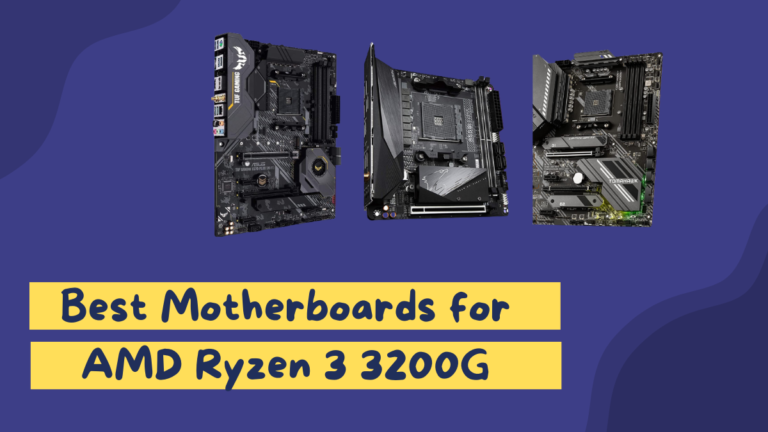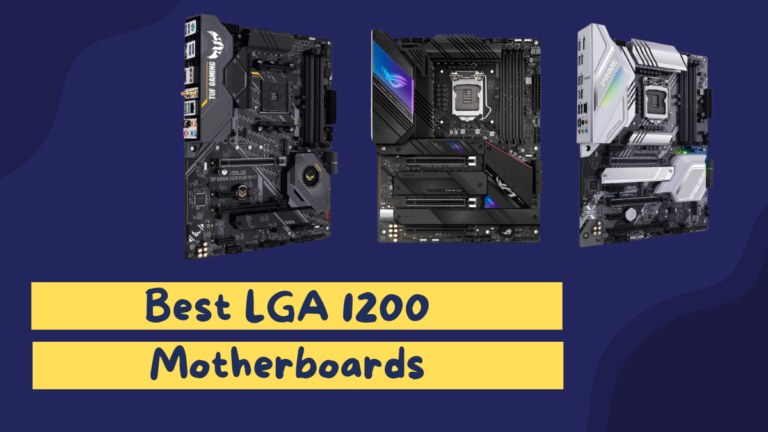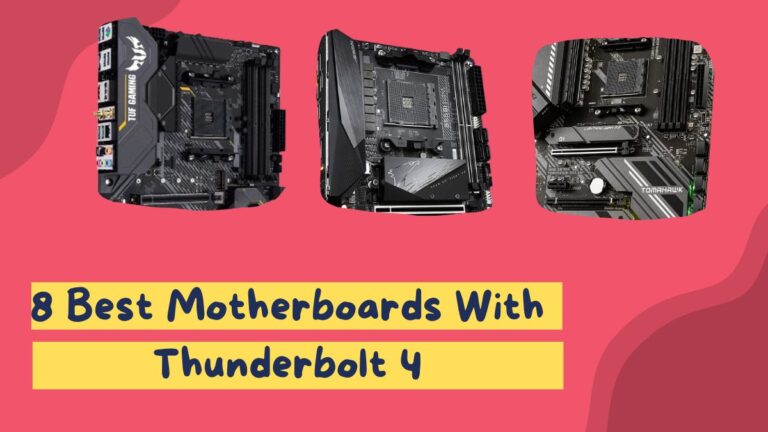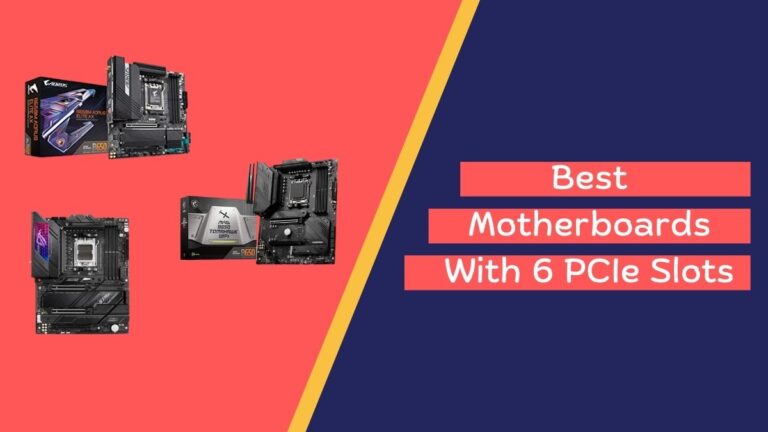8 Best Intel LGA 1151 Motherboards in 2024
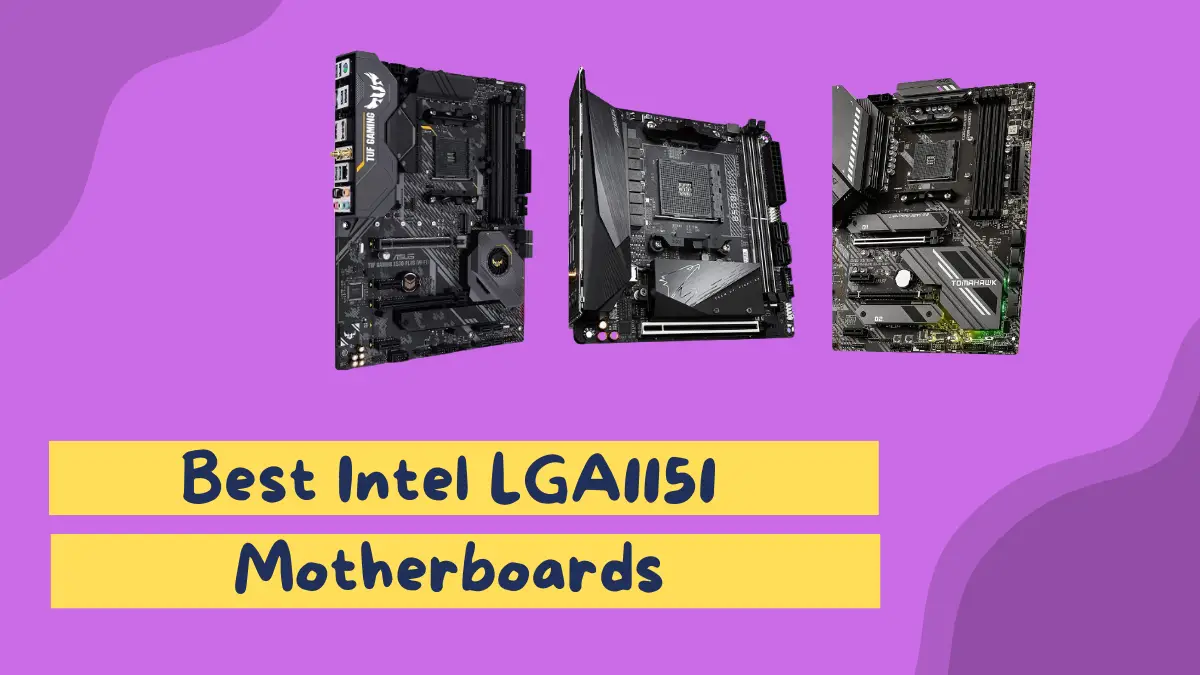

The ultimate computing experience is not possible without a powerful motherboard. Your PC performance greatly depends on the motherboard you use. So, choosing the right motherboard for your computer is important.
As for the Intel LGA 1151 motherboards, there are several reasons why they are the top contenders for users, particularly gamers. For instance, these motherboards support long gaming sessions and have advanced memory setups to provide fast data transfers.
But before choosing an Intel LGA 1151 motherboard, you should know what you want from it. Is it better performance, overclocking support, increased memory limit, or better aesthetic appearance of your setup?
When you know the answer, only then can you choose an effective LGA 1151 motherboard that supports your PC and provides optimal performance. In this guide, we’ll review and compare the best LGA 1151 motherboards to help you determine which one to pick.
With that said, let’s dive in!
Quick Picks
If you’re in a hurry, here are our top recommendations:
| Image | Product | Key Features | Price |
|---|---|---|---|
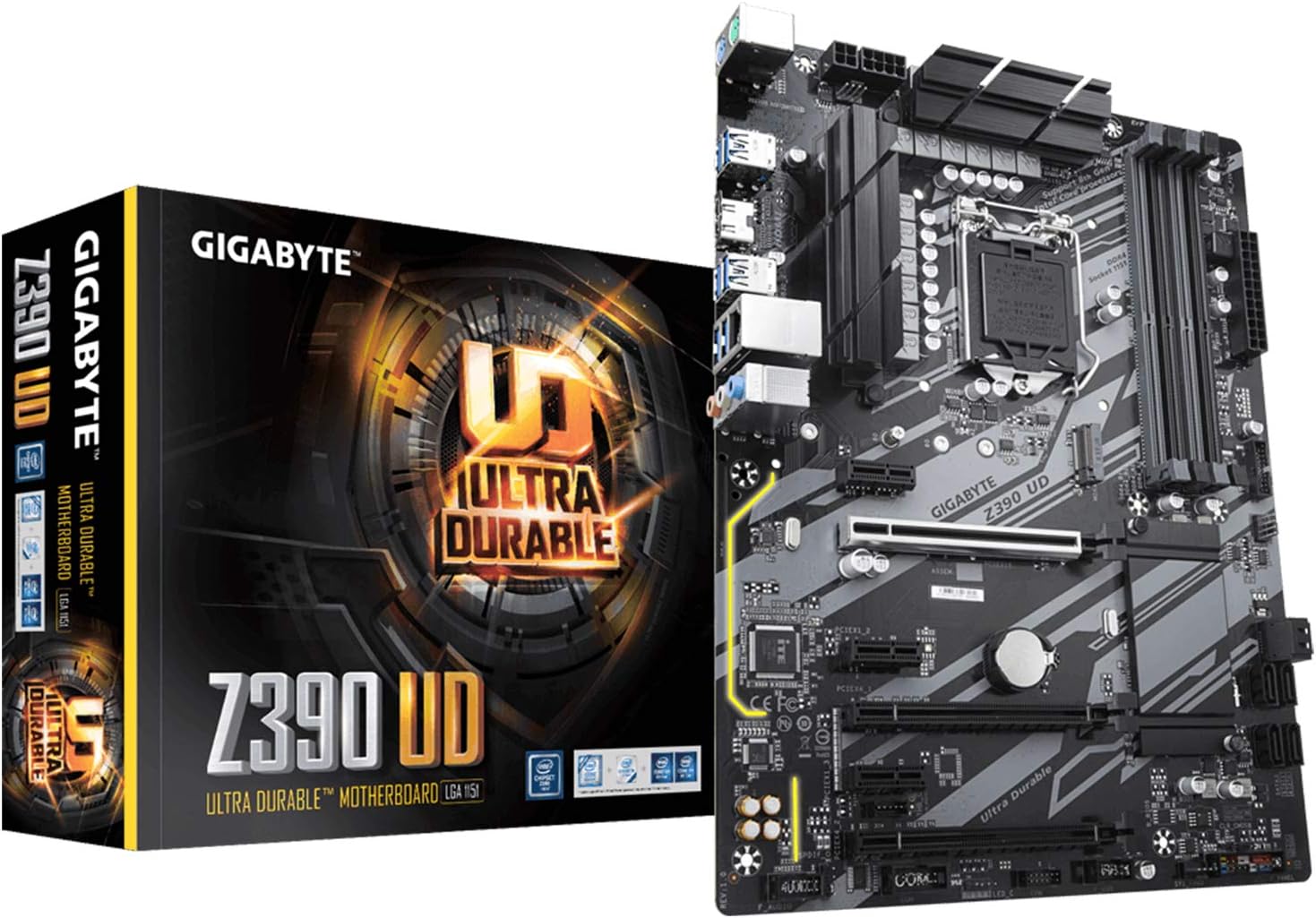  |
GIGABYTE Z790 UD – Best Overall | – LGA 1151 socket for Intel 8th and 9th Gen CPUs – Dual Channel Non-ECC unbuffered DDR4, 4 DIMMs – High-quality audio capacitors – GIGABYTE Exclusive 8118 Gaming LAN |
Check Price |
  |
GIGABYTE B660M – Runner Up | – PCIe 5.0 and DDR5 support – Comprehensive cooling solutions with VRM heatsink – ASUS OptiMem III for boosted memory performance – 5X Protection III with LANGuard and more |
Check Price |
  |
ASUS Prime H670-PLUS D4 – Budget Pick | – PCIe 4.0 compatibility – ASUS OptiMem II for boosted memory performance – Supports DIGI+ VRM, DRAM overcurrent protection, overvoltage protection, and more – Decent cooling features like PCH heatsink, hybrid fan headers, and Fan Xpert 4 |
Check Price |
With that out of the way, here’s an overview of these motherboards:
1. Gigabyte Z390 UD – Best Overall
Overall, this is the best Intel LGA 1151 motherboard, as it provides impressive performance with advanced motherboard features and memory setups.
2. ASUS Prime Z690-P – Runner Up
The is the runner-up for Intel LGA 1151 motherboards. It offers newer-generation connectivity options with support for fast-speed RAM.
3. ASUS PRIME Z590-P – Budget Pick
This is the best budget-friendly Intel LGA 1151 motherboard, as it supports USB Type-C ports, newer-generation PCIe 4.0 slots, and even wireless connectivity options at a low price.
That said, let’s roll into detailed reviews.
Reviewing the Best Intel LGA1151 Motherboards
Below we’ll review the finest Intel LGA1151 motherboards available:
1. Gigabyte Z390 UD – Best Overall
This motherboard packs a decent build quality and supports high-end RAM with a fast 2666 MHz clock speed.
This LGA 1151 motherboard comes in a simple design and has an ATX factor – the most popular size for motherboards.
Moreover, it has many PCIe 3.0 x16 and PCIe 3.0 x4 slots to comfortably support all your expansion cards. Its max memory amount is 128 GB, and it packs SATA 3 connectors. These connectors let you connect mass storage devices to your computer to provide fast data transfer speeds.
Further, you can also connect fast-speed SSD drives to this motherboard, thanks to its M.2 slots. Apart from that, this motherboard offers WiFi to let you connect your computer to the Internet wirelessly. It’s also Bluetooth-enabled to ensure you can share data with your other Bluetooth devices like headphones and smartphones.
This motherboard also performs well in terms of cooling, offering 8 fan headers with high-quality heatsinks. But one thing we disliked about it is its unsatisfactory overclocking support since it heats a little when overclocked.
But overall, we believe it’s the best Intel LGA 1151 motherboard as it provides excellent features like high-speed RAM, M.2 SSD slots, and wireless connectivity options.
Pros
- Fast-speed RAM with a 2666Mhz speed
- Popular ATX form factor
- M.2 slots
- Supports Bluetooth and Wifi
Cons
- A bit pricey
- Poor overclocking
Check out our guide on the best M.2 motherboards to find yourself a suitable motherboard for connecting your M.2 SSD.
2. ASUS Prime Z690-P – Runner Up
Here we’ve got another decent Intel LGA 1151 motherboard. Unlike the above option, it offers a RAM speed of 4800 MHz with a max 6000 MHz clock speed. Further, it has four RAM slots with two memory channels to support sufficient RAM for your computer.
This motherboard also performs well in terms of connectivity as it offers a USB Type-C port to connect your Type-C peripherals without an adapter. Further, it has a range of USB Type-A ports to support your everyday devices like mouse, keyboard, and headphones.
You also get four SATA 3 connectors to connect your mass storage devices. On top of that, this motherboard also offers the newer generation PCIe 4.0 x16 slots with double the transfer speed of the previous generation PCIe 3.0 slots.
Pros
- Newer generation PCIe 4.0 x16 slots
- USB Type-C port
- Fast-speed RAM with 4800 MHz speed
Cons
- Lacks a built-in WiFi
3. ASUS PRIME Z590-P – Budget Pick
This motherboard supports PCIe 4.0 slots to provide high-speed data transfer rates – twice as fast as PCIe 3.0 slots. Further, it supports 128 GB RAM to make your setup future-proof. On top of that, it provides a 3200MHz RAM speed, with over 5133 MHz overclocking speed. Like most motherboards, it offers four RAM slots for your convenience.
Regarding connectivity options, this motherboard offers a USB type-C port for your type-C peripherals. It also packs an impeccable cooling system, making it ideal for long gaming sessions.
But one thing we disliked about it is it lacks wireless connectivity options like WiFi and Bluetooth. Further, it also misses out on M.2 slots, meaning you cannot connect M.2 SSD drives to this motherboard.
But overall, it’s a great budget motherboard as it offers decent connectivity options and performance features for a low price.
Pros
- Heatsinks to allow better airflow
- USB Gen 3.2 Type-C
- Sturdy design
- PCIe 4.0 support
Cons
- No M.2 slots
- Unimpressive design
Read our guide on the best Ryzen 5 3500 motherboards to find a great motherboard for your Ryzen build.
4. ASUS TUF Z390 Motherboard – Impressive Connectivity
This motherboard has a GPU temperature-sensing feature to help cool down your device. It is known for its durability and has a southbridge heatsink and extra chips to protect electrostatic discharge. Moreover, it also helps prevent over-voltage.
It also has PCIe x16 slots with up to 64 GB RAM support. Six SATA connectors comfortably connect your storage devices to your computer.
This motherboard has better connectivity with USB 3.1 Gen 2, Gigabyte LAN, and dual M.2. Its next-generation connectivity is enhanced by PCIe 4.0. And USB 3.2 Gen 2 Type A and Type C. It gives users an impressive online gaming experience with 2.5 Gb ethernet and TUF LANGuard technology.
Pros
- Over-voltage protection
- Better cooling system
- Longer lifespan and durability
- Six SATA connectors
Cons
- Limited audio jacks
- The RGB Lighting could be better
5. ASRock H370M-HDV – Wifi-Enabled
This motherboard is one of the finest LGA 1151 motherboards with WiFi support. It comes in a Micro-ATX form factor, making it an excellent fit for compact PC setups. Further, it offers an eight-pin CPU connector with up to 95W power to support all major processors.
Apart from that, this motherboard offers newer-generation WiFi to connect your computer seamlessly to the Internet. Other salient features of this motherboard include support for 8th and 9th-generation processors and four SATA slots with 6 GB bandwidth. Further, it also has two USB 3.0 ports and PCIe x16 ports for effective connectivity.
But unfortunately, its RAM capacity is limited to 64GB. Don’t get me wrong – 64GB is sufficient for most users, including hardcore ones. But if you’re seeking a future-proof motherboard, one with a 128GB RAM limit would be preferable.
Pros
- Highly efficient CPU delivery
- Value for money
- Supports both LAN and WiFi
Cons
- Zero LEDs lighting
- Its WiFi is limited to 433 Mbps
6. ASUS ROG Strix B660-A – Gaming Pick
This gaming motherboard is the dream of gamers, thanks to its support for immersive graphics cards and powerful processors. Though it’s at the higher end in terms of the price range, it provides excellent value for your money.
This motherboard packs a premium audio codec, effective power delivery, various USB ports, and other great features.
It has more than four USB 2.0 ports to connect your peripherals conveniently, including the mouse, keyboard, headphones, and more.
This motherboard boasts good performance, thanks to its DDR5 RAM. It also has a unique audio system thanks to the Realtek ALC892, which has audio capacitors and PCB divisions. These features contribute to a better user experience.
However, this motherboard has slight thermal throttling issues, which can lead to overheating if you put a lot of load on this motherboard. Nonetheless, it offers 4-pin fan headers to provide good cooling. Unfortunately, it has no M.2 slots. Another downside of this motherboard is the lack of overclocking option.
Pros
- Impressive RGB Lighting
- Supports DDR5 RAM
- Good for long gaming sessions
- High-quality Dolby atmos audio
Cons
- No overclocking option
Check out our guide on the best motherboards for gaming under $200 to find yourself a gaming motherboard under a budget.
7. MSI Z490-A PRO – Best for Cooling
This motherboard has Zero Frozr technology to ensure the motherboard stays cool under intense pressure. It also packs an extensive heatsink for effective cooling.
This motherboard also performs well in appearance, thanks to its decent RGB lighting setup. But since it’s more than aesthetics, you also get fast networking performance, thanks to the fast-speed 2.5G LAN. This motherboard packs PCIe 3.0 and 4.0 slots for fast data transfer speeds.
It also has 6 layers of PCB for long-term stability and a premium layout of eight-pin power connectors for optimal performance.
Overall, we believe it’s the best Intel LGA 1151 motherboard in terms of cooling, thanks to its Zero Frozr cooling technology and extended heatsinks.
Pros
- Effective cooling system
- Excellent for extended gaming sessions
- Good value for money
Cons
- Sensitive BIOS
8. MSI MAG B550 TOMAHAWK – Premium RGB Lighting
This motherboard packs decent RGB lighting to give an aesthetically pleasing look to your gaming setup. It’s also well put together to ensure it’s durable and long-lasting.
Further, it provides good networking and connectivity options. For instance, you get two USB Type-C ports to connect your Type-C devices like a charm. Speaking of networking, it offers a decent LAN setup with 2.5 Gbps bandwidth. The whole motherboard is illuminated with RGB lighting, which is located under the heatsink of the chipset.
Moreover, it comes in ATX form factor to support most PC cases available. Also, its AMD B550 chipset is widely compatible with most LGA 1151 processors on the market.
This motherboard also has two heat sinks which are sufficient enough for overclocking. It has installed buttons for MSI GAME BOOST auto-clocking and in-Windows overclocking tools.
But one thing we disliked about this motherboard is it lacks built-in WiFi. So, you can only connect it to the Internet through an ethernet cable. An alternative would be a dedicated Wifi adapter or Wifi expansion card.
Also, it cannot operate with DDR4 RAM. But overall, we believe it’s the finest-looking Intel LGA1151 motherboard, thanks to its premium-looking RGB lighting and sturdy design.
Pros
- Effective overclocking
- Two USB Type-C ports
- Fast-speed 2.5 Gbps LAN
Cons
- No built WiFi
- Mediocre audio system
We’ve also reviewed the best LGA 1200 motherboards in this guide.
Best Motherboards for Intel LGA 1151: Buying Guide
Since a wide variety of LGA 1151 motherboards is available, finding the right motherboard for your setup can take time and effort. This buying guide will give you essential information on LGA 1151 motherboards to help you make an educated decision.
What Motherboard Do You Need for the Intel LGA 1151 Socket?
The motherboards with the Z390 chipset are some of the finest motherboards you can get for your LGA 1151 socket. They’re ideal for Intel PC setups. If you’re seeking an affordable motherboard, the ones from the ASUS TUF series with Z390 chipset are preferable.
Generally speaking, the Intel LGA 1151 socket is compatible with a wide variety of chipsets, including Intel B150, Q150, Q 170, H110, H170, Q170, and Z170 chipsets.
So, any motherboard packing one of these chipsets will be compatible with processors running off the Intel LGA 1151 socket.
That said, we included motherboards with chipsets compatible with Intel LGA 1151 in this guide. Let’s dive into their reviews.
Things to Consider When Choosing an LGA 1151 Motherboard
Below are the most important factors to consider when deciding on an LGA 1151 motherboard.
Ports & Connectivity Options
Regarding ports, your LGA 1151 motherboard chipsets should have enough display and USB ports to connect your monitor/s, devices, and peripherals.
Most motherboards include enough USB Type-A ports to connect your keyboard, mouse, and other essential devices. But only a few include the USB Type-C (thunderbolt) port that provides fast data transfer speeds. When seeking an LGA 1151 motherboard, ensure it has the USB Type-A and Type-C ports you need.
Further, motherboards pack display ports to connect your display, including HDMI, VGA, DVI, DisplayPort, and Thunderbolt ports. Go for a motherboard that includes the display ports you need.
CPU Compatibility
When choosing an Intel LGA 1151 motherboard, ensure it’s compatible with your processor. Your motherboard’s chipset must be compatible with the socket of your processor.
If your processor’s socket is LGA 1151, opt for motherboards that support this socket. The commonest chipsets compatible with LGA 1151 socket are B150, Q150, Q 170, H110, H170, Q170, and Z170 chipsets.
Storage Support
Motherboards offer different options for connecting your storage drives. The classic storage connection is SATA. But since it’s an old protocol, it’s not that fast or convenient.
On the other hand, the modern-day storage protocol is the NVM Express protocol. It uses PCIe slots for transferring data at high speed.
Form Factor
Motherboards come in different form factors and, therefore, fit different PC cases. In simple words, the form factor of a motherboard refers to its size. The commonest motherboard form factors include ATX, Mini-ATX, and Micro-ATX.
ATX is the standard-sized motherboard form factor, also the largest one. Most PC cases, especially desktop and tower ones, support the ATX form factor. Moreover, the same cases tend to support Micro-ATX motherboards, too for versatility.
Check out our guide on how to know if a motherboard fits your PC case to learn more about motherboard form factors and which one you need.
RAM Capacity
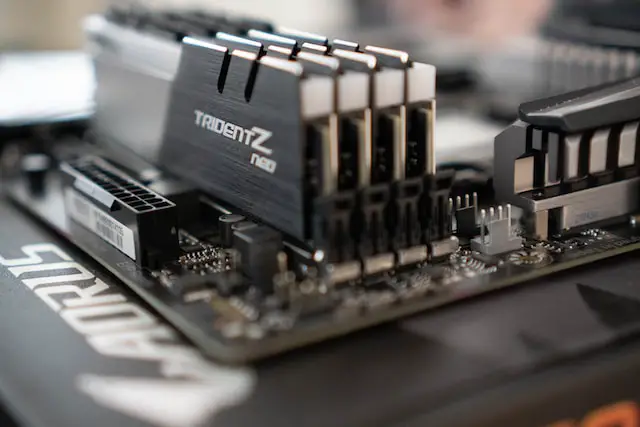

Your motherboard’s RAM capacity determines how much RAM you can install on it. Most motherboards allow installing up to 128GB RAM. It’s more than enough for most users since 8-32GB RAM setups are more common.
But opting for a motherboard with high RAM capacity is preferable to future-proof your setup, particularly because motherboards tend to last for decades.
Support for Overclocking
Overclocking refers to temporarily boosting the performance of your computer’s hardware parts, such as the CPU and GPU. Since it leads to excessive heat release, you need a motherboard that offers a good cooling system and support for overclocking to use this feature.
Support for WiFi and Bluetooth
Another important thing to consider when deciding on an LGA 1151 motherboard is support for wireless connectivity options like WiFi and Bluetooth. The support for WiFi will ensure you don’t need an ethernet cable to connect your computer to the Internet.
Bluetooth connectivity lets you connect your computer to other devices like your smartphone for data sharing.
Additional Buying Tips
Here are some other things to keep in mind when choosing an Intel LGA 1151 motherboard:
Go for a motherboard with a warranty
A motherboard with a warranty gives you peace of mind, knowing the manufacturer will repair or replace the motherboard at no additional cost if you face an issue within the warranty period.
Opt for a motherboard with good cooling
Motherboards with good cooling prevent overheating to maintain optimal performance. Plus, good cooling improves the lifespan of a motherboard’s components by ensuring they don’t fry out due to overheating.
Ensure it’s from a trustable brand
Motherboards from trustable brands offer many benefits, such as increased reliability and quality. Plus, these motherboards are more widely compatible with hardware parts and PC cases for your convenience.
What is Intel LGA 1151?
Intel LGA 1151 is a processor socket that came out back in 2015. Since its inception, many Intel processors have been equipped with Intel LGA 1151 sockets. The motherboards that support these processors are termed LGA 1151 motherboards. Generally speaking, the LGA 1151 processors are from the 8th and 9th generations.
Which Intel Processors Have LGA 1151?
The Intel processors with LGA 1151 sockets belong to the 6th, 7th, 8th, and 9th generations.
The first version of LGA 1151 is designed for Skylake and Kaby Lake CPUs. Whereas its second version supports Coffee Lake CPUs in particular.
FAQs on LGA 1151 Motherboards
Below we’ll answer the most frequent questions regarding Intel LGA 1151 motherboards:
The LGA 1151 socket is found in Intel Core i9 processors belonging to Skylake and Kaby Lake series. To be precise, Intel’s 8th and 9th generation processors tend to be compatible with the LGA 1151 socket.
The LGA 1151 is designed for a wide range of processors, including Celeron, Core i3, Core i5, Core i7, Xeon, and Pentium. A famous example of an LGA 1151 CPU is Intel Core i7-9700K.
Most LGA 1151 motherboards support DDR4 RAM. But some LGA 1151 motherboards, including ones with H110, B150, and Z170 chipsets, use DDR3L RAM.
Final Words
Now that we have had a comprehensive look at the best budget LGA 1151 motherboards, we hope you can find a suitable one for yourself if you’re seeking a good-quality motherboard for your processor with an LGA 1151 socket. Until next time, cheers!
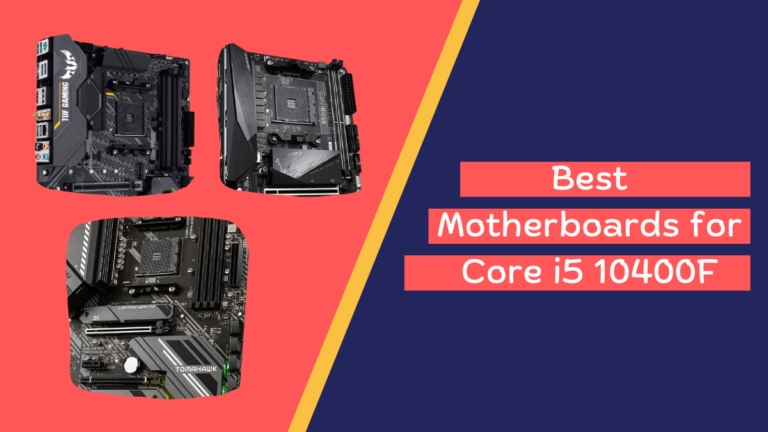
![6 Best Motherboards for VR [Top Picks for 2024]](https://motherboardtimes.com/wp-content/uploads/2023/04/best-motherboards-for-vr-amd-intel-768x432.jpg)
